Government
TCI Moving to Catch Up in Clean Energy Race, attends CDB Conference
Published
1 year agoon

By Dana Malcolm
Staff writer
#TurksandCaicos, March 24, 2023 – In an effort to speed up the transition to clean energy in member countries, the Caribbean Development Bank recently held the first CDB-Accelerated Sustainable Energy and Resilience Transition (ASERT-2030) Workshop, of which the Turks and Caicos Government was a part.
It comes as the Turks and Caicos aims to catch up on its transition to renewable energy through the creation of a sound legislative framework. Clean energy percentage for the TCI, according to a CDB analysis has been very low so far.
Delano Arthur, Energy and Utilities Commissioner and Dr. Eric Salamanca, Energy Analyst, represented the country in the two-day workshop which gathered energy sector stakeholders from across the region to develop assistance programmes.
Those programs are designed to guide how the CDB and other partners will give support (likely monetary) to the borrowing members of the Bank, which includes the Turks and Caicos, to reach their sustainable energy goals. 
During the Caribbean Development Bank Meeting held in the Turks and Caicos in June 2022, sustainable energy specialist Christopher Straughn revealed that the region needed over $1 Billion in financing to reach its 2030 goals.
At the time, The Turks and Caicos Islands, Anguilla, British Virgin Islands, the Cayman Islands, Grenada, Montserrat, St Kitts and Nevis, St. Lucia and Trinidad and Tobago were all doing extremely poorly on their sustainable energy transfer goals, clocking below 10 percent.
ASERT is supposed to fix this by driving countries forward with both monetary support and providing technical road maps for them to hit their targets.
TCIG says this first workshop referred to as the Regional Regulatory ASERT Dialogue (RR-Dialogue) focused on:
- Agreeing on funding support strategies
- Agreeing on a framework for planning, coordination and tracking the progress of the country’s regulatory readiness to support investments in renewable energy;
- Shared lessons on challenges and solutions for regulatory reform in different countries.
TCIG in a statement explained that its representatives made significant headway in establishing linkages for the country during the conference.
“[They] established contacts with key stakeholders in the industry like the regulators in the region, CEO of regulatory bodies, the OOCUR, the World Bank, the IDB, the Caribbean Development Bank, the USAID, the EU, the Canadian Government, the CCREEE; among others,” it said.
The Government has a renewable energy goal of releasing less than 500 metric tons of carbon dioxide annually.
You may like
-
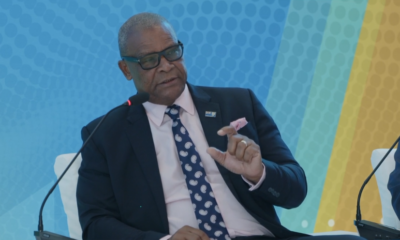

What the Premier believes is the way to Cheaper, clean Energy
-
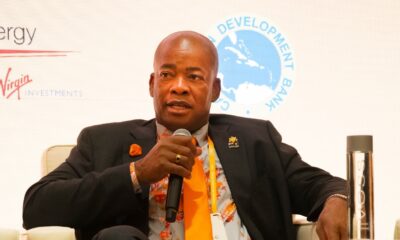

TCI Looking to Speed up ENERGY TRANSITION
-
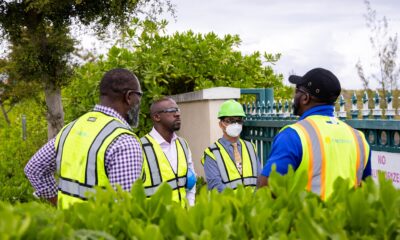

Cost of Power Bills tops talks when FortisTCI & Gov’t Energy Team Meets
-
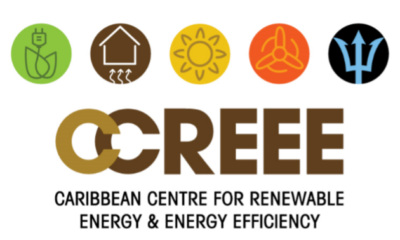

Internship 2023 for TCI Energy Data Collection
-
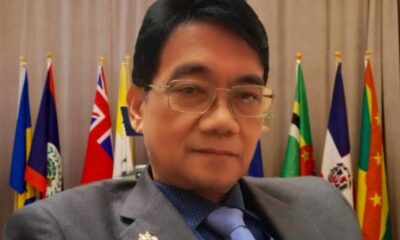

Eric Salamanca is TCI’s new Energy Commissioner; TODAY he announces EU funding for Renewable Energy
-


CDB Meetings reveal Caribbean lagging in Renewable Energy, Billion$ needed to cross the line
Government
Harold Charles, Appointed Member to the HOA, goes out with a Bang
Published
6 days agoon
April 19, 2024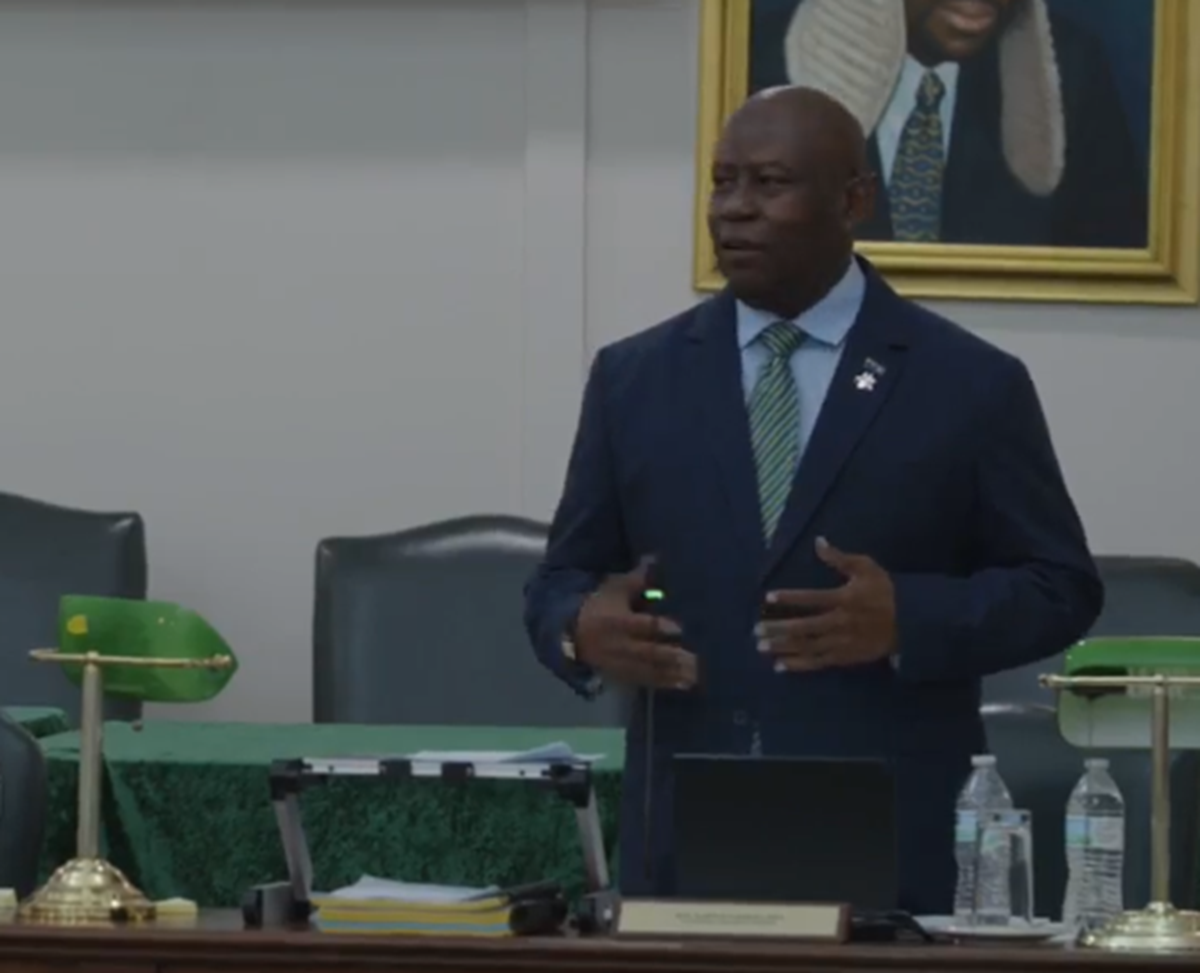
Dana Malcolm
Staff Writer
#TurksandCaicos, April 19, 2024 – In an explosive, self-proclaimed, final budget speech to the people of the Turks and Caicos, Harold Charles, Governors Appointed Member is expressing frustration that many Turks and Caicos Islanders are locked out of top jobs in the country and unable to build wealth.
”I’ve been in this country for 50 years and I’ve noticed all those big developments that come in— the majority of [managers]are foreign people. After 50 years, when are we going to have Belongers manage those businesses?” Charles asked. “I’m upset, I’m frustrated [this is] their home. They have nowhere else to go—- If we don’t empower our Turks and Caicos Islanders we will never get out of living paycheck to paycheck.”
Charles echoed what thousands of locals have been saying for years about the failure of successive governments to get the economic success in the country on a level that residents can participate in it. The member maintained that not only were many locals working for scraps overseas and at home, but that it was the prerogative of the government to create avenues for them to move upward.
”I know the government’s heart is in the right place but somehow we’re not getting it together. I’m talking (about) both PDM and PNPs. It must change. There are many islanders overseas taking crummy jobs when all this opportunity is in the Turks and Caicos Islands.”
Calling on the government to enforce laws which allow islanders to get a foothold in lucrative industries, Charles maintained that TCIG could not let investors come and do as they liked.
”We have all these big companies making millions. They brag about how much they’re making, yet how much do they contribute to the development of our people?”
Charles encouraged the government to mandate that locals were hired in the large developments, taking place across the country.
Capital projects and their execution was another issue that the member highlighted
”Over the past three years in office, we seem to be dragging our feet when it comes to the execution of projects,” he said, “the last budget reflected bitter-sweet sentiment.”
The government managed to spend $29 million of a $57 million capital project budget in 2023/24 financial year.
“Mr. Speaker prior, we promised the people infrastructural investment, improved roads, ease with doing business with TCIG, more scholarships, increased home care, a $900,000 special needs school.”
The Appointed member was also frustrated with the amount of money being allocated to crucial areas including the absence of allocations for a special needs school.
”We were promised that no Turks and Caicos Islander would be left behind while I appreciate the government’s commitment to ensuring this. I am concerned that the relatively low level of funding allocated to education and infrastructure may hinder the effectiveness of effort,” The member stressed.
Closing his speech, Charles maintained that it was “crucial that the sectors receive additional support in order to provide citizens with the necessary resources and opportunities for their development.“
Mr. Speaker it is imperative that we allocate our resources adequately and streamline processes to enhance the ease of doing business with the Turks and Caicos Government. We must priortise increasing service delivery capacity in critical departments such as the customer service department, the register of records, the department of motor vehicles and the list goes on,” express Charles.
Charles reminded that there is a growing demand on the services TCIG provides, especially as the country enjoys unprecedented, year on year, exponential economic growth.
Charles alongside Jameka Williams (Government Appointed Member) Willin Belliard (Governor’s Appointed Member number one) and Alvin Garland (Opposition Appointed Member) will very likely be the last set of appointed members in the House of Assembly of the Turks and Caicos as it transitions to a wholly elected parliament.
Harold Charles indicated it was unlikely he would join any leadership race describing the 2024-2025 Budget contribution as likely his final.
Government
OFFICE OF THE DEPUTY PREMIER & MINISTRY OF PHYSICAL PLANNING & INFRASTUCTURE DEVELOPMENT
Published
7 days agoon
April 19, 2024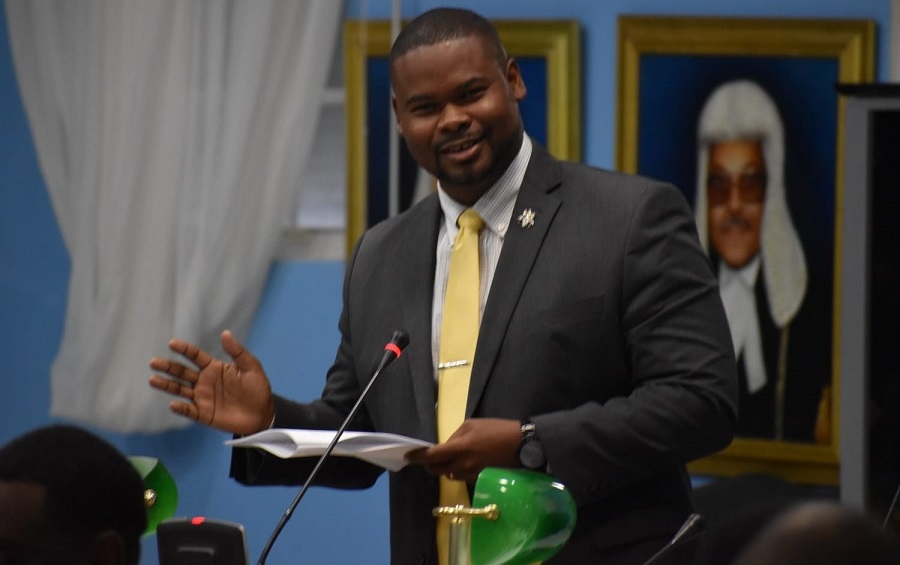
Ministerial Statement April 18th, 2024
Mr. Speaker, fellow colleagues, strangers in the gallery, and the citizens of our great nation, it is indeed a great day here in these islands and certainly a privilege to be in the Nation’s Capital, here in the people’s house to deliver on behalf of the people of this country. Mr. Speaker, I align myself with the condolences expressed, particularly to the Freites family here in Grand Turk, especially Ms. Elizabeth whom we work very closely with in the Premier’s Office.
Proverbs 21:5 reads; “The plans of the diligent lead to profit as surely as haste leads to poverty.” Mr. Speaker, this scripture emphasizes the importance of careful planning and diligence in managing the finances of this country. We are fully cognizant, Mr. Speaker, that the public purse belongs to the people and so we have diligently strategized how we will not only spend but invest every cent into the development of this country and its citizens. As I rise today, Mr. Speaker, I am excited as Minister of Physical Planning & Infrastructure Development, imbued with a profound sense of responsibility and a distinct vision for the future of our country’s infrastructure. Our mandate is clear: to build and maintain the physical foundation upon which our society thrives. Our commitment is to enhance the quality of life for each citizen, to develop our communities, and to strengthen the backbone of our economy; our infrastructure.
Mr. Speaker, there are several Departments under our Ministry’s purviews. Allow me to take this Honorable House through our achievement and our goals over the next fiscal year.
*Department of Planning: **
The Department of Planning is tasked with formulating comprehensive and sustainable development plans across the country. In our quest to make services more accessible and transparent, the department will enhance data collection, analysis, and stakeholder engagement to ensure that our planning processes are inclusive and responsive to our citizens’ needs. Mr. Speaker, this new application system will enable the Department to automate plan submissions, review and approve during the processes. Users will be able to import plans and supporting documents directly into the system where they are automatically organized and routed to the appropriate viewers. Through these efforts, community development and infrastructure initiatives will be accelerated. This new electronic plan review system will transform the planning process and support efficient collaboration and improve public transparency. This initiative will enable us to build more resilient and vibrant communities for the future. This, Mr. Speaker, is the work of a progressive Government.
Over the past year, The Department has been working closely with the informal settlements unit to address these settlements within our communities. One hundred and sixty-five (165) structures have been identified for demolition, two hundred and eighteen (218) enforcement notices have been issued, three cases progressed before the court and twelve (12) penalty fines distributed totaling seventy-five thousand dollars. Mr. Speaker, this is a government in action.
Mr. Speaker, we have made progress in advancing the review and amendment of the National Physical Development Plan 2020 to make changes to the zoning of specific parcels. These amendments will facilitate sustainable urban development while ensuring compliance with local regulations and addressing community needs as they arise. This has already been noted in Cabinet and will progress to the next stages. They say the proof is in the pudding? Well, it just got sweeter because we are delivering for the people and doing more in 2024.
**Department of Housing and Community Renewal: **
Affordable housing and community renewal are key priorities for our government. The Department of Housing and Community Renewal will receive significant funding to support the development of affordable housing projects, improve community infrastructure, and revitalize blighted areas. We are committed to ensuring that all our citizens have access to safe, decent, and affordable housing options. Mr. Speaker, following the successful launch of the National Housing Policy, the Department has made significant strides in achieving its objectives. The application process was opened to the public and eleven (11) applications were received for program 1, three hundred and thirty-two (332) applications under program 2 and thirty-eight (38) expressions of interest in program 3. Of the 332 applications received, 289 were shortlisted. These applications have been grouped into batches and repairs for the first batch of applicants are due to commence shortly. The Cabinet has approved the proposal to streamline the allocation of Crown Land for Housing Development from recommendations made during the public consultation. Vehicles for this department have been tendered and we hope to have them mobilized very soon to assist with conducting site inspections during the construction phase of these projects. The Department has proposed a detailed concession package for developers under our program 1 which will incentivize their participation along with other benefits. Mr. Speaker, I know some people here are like doubting Thomas; they need to see it to believe but things are happening in this department. We are developing an online application portal to streamline the submission process of applications where the public and potential developers can upload all attachments from one location, minimizing errors and improving efficiency. Mr. Speaker, an affordability index is also being developed by the Housing Department to determine what constitutes affordable housing across the various islands and constituencies considering factors such as housing costs, household size etc. and this is being done in collaboration with the Statistics Authority. It’s been a long time coming but change is here.
**Department of Estates Management: **
The efficient management of government estates is essential for the effective delivery of public services. The Department of Estates Management will receive additional resources to maintain and upgrade government buildings, improve efficiency, and ensure a conducive working environment for civil servants. We will also explore opportunities to optimize the use of government assets. Mr. Speaker, our public service is growing, Ministries and Departments are outgrowing their current workspaces, and Estates Management must move quickly to secure comfortable working environments for staff across the Government. To this end, a sum of $5.4M has been allocated for rental spaces to ensure that our people are in suitable environments to carry out the work that they are expected to produce. This is an increase of 15% over last year’s outturns. Mr. Speaker, within the last fiscal year, attempts were made to privatize janitorial services, however, because we are a government who seeks to do things and do it well; we’ve met some challenges during the process and therefore made the decision to delay this project until the appropriate mechanisms have been established.
**Public Works Department: **
The Public Works Department which is responsible for the construction and maintenance of public infrastructure have an allocated sum of over $7M to support the rehabilitation of critical infrastructure, expand access to underserved areas, and enhance resilience in infrastructure projects. Our goal is to create a robust and reliable infrastructure network that supports economic growth and social development.
**Mechanical Department: **
The Mechanical Department plays a crucial role in maintaining and repairing essential mechanical systems in government buildings and infrastructure. We have allocated funds for the procurement of new equipment to improve the standards of the mechanical workshops across the islands by conducting repairs to the facilities and procuring heavy duty and specialist equipment. Training of personnel, and the implementation of preventive maintenance programs to ensure the efficient operation of mechanical systems across the country is also a priority for this division. We have commenced the preparation for a new government fleet which will include streamlining the procurement process, reviewing the existing fleet and preparing for the support of plug-in hybrid units and eventually move towards electric capabilities. Mr. Speaker, we are currently working assiduously to finalize the vehicle policy that will apply to ministries across government. It has already been drafted and circulated and will move to its final stages to be submitted to Cabinet for approval.
**Project Management Department: **
Effective project management is essential for the successful implementation of infrastructure projects. The Project Management Department will receive increased funding to strengthen project oversight, improve coordination among stakeholders, and enhance the monitoring and evaluation of projects. We are committed to delivering projects on time, within budget, and to the highest quality standards. Mr. Speaker, this budget allocation will facilitate training and certification of our staff compliment in FIDIC contracts, project management PMI and PMP from the project Management Institute, RICS for quantity Surveyors and Estimators, and other technical areas across various disciplines to ensure they remain current with standard procedures and industry practices.
**Maintenance Department: **
The Maintenance Department plays a vital role in ensuring the ongoing upkeep and maintenance of public infrastructure assets. We have increased funding for routine maintenance activities, repair works, and asset management programs to prolong the lifespan of infrastructure assets and reduce long-term maintenance costs. We are committed to ensuring that our infrastructure remains safe, functional, and sustainable for years to come.
Firstly, Mr. Speaker, the maintenance of schools and other public buildings is not just an investment in bricks and mortar; it is an investment in our future generations. Therefore, we are dedicating a significant portion of our budget to ensure that our educational facilities are not only safe and conducive to learning but are also equipped to inspire and nurture the leaders of tomorrow. We will be upgrading classrooms, improving sanitation facilities, and ensuring that our schools are technologically ready to meet the demands of modern education.
Secondly, Mr. speaker, we are acutely aware that our nation is no stranger to the wrath of nature. Hurricane shelters are a critical aspect of our disaster preparedness strategy. This year, we are increasing funds allocated to the strengthening and expansion of our hurricane shelters. These sanctuaries must be capable of withstanding the severest of storms, offering a haven to those whose homes are threatened.
In the realm of road maintenance, our budget reflects an understanding that well-maintained roads are the arteries of our economy facilitating daily commutes. We are earmarking substantial resources for the repair and resurfacing of roads, and the implementation of modern traffic management solutions to reduce congestion and enhance safety. Mr. Speaker, $2M has been allocated for the initial phase of solar streetlights across constituencies, $2M for road paving and grading, an additional $1.35M in the Framework Agreement to aid in the delivery of the Public Work Ordinance. We aren’t talking small change Mr. Speaker; we are spending big money.
Moreover, community enhancement is a testament to our belief in not just the functionality, but also the spirit of our public spaces. We are significantly increasing the budget to beautify parks, create public recreational facilities, and revitalize communal spaces. These projects are designed to foster community pride, encourage social cohesion, and promote improved family lifestyles.
Disaster Management & Emergencies
As Minister with responsibilities for the Department of Disaster Management, I am pleased to report Mr. speaker that we have given this Department two new homes in both Grand Turk and Providenciales through the purchase of a building that will serve as the headquarters and office space and the eminent relocation. Now the team will have adequate space for effective coordination of responses to emergencies. Strategic investments are at the core of this government, focusing on long-term benefits rather than short-term gains.
Mr. speaker with a designated $1.4M for generators and housing we are ensuring that the department is equipped with the necessary resources to effectively navigate any potential adverse outcomes. We are also relocating the Grand Turk team to their new office space. The budget delineates clear priorities, earmarking funds for crucial sectors such as disaster management; considering the investments outlined earlier along with significant funding for the maintenance and upkeep of our registered shelters.
Policy, Planning & Technical Support
In alignment with our national vision and development goals, we have formulated robust policies aimed at guiding the sustainable growth and modernization of our ministry’s capabilities. We have adopted a comprehensive approach and recognized that the successful implementation of our ambitious agenda requires not only vision but also technical expertise. Therefore, $1.8M earmarked for professional and consultancy affords us the opportunity to provide greater support to projects going forward.
Mr. Speaker, economic projections suggest that the implementation of this budget will lead to job creation, increased productivity, and a more robust economy and so we will improve efforts to engage contractors with periodic training sessions throughout the year equipping them with the skillset to prepare proper bids for both recurrent and capital projects. The intention is for these sessions to be hosted on all islands. Our upcoming 3rd annual contractor’s symposium will further solidify their knowledge enabling our local contractors to participate in works issued by our ministry. Mr. speaker, our aim is to create a skilled workforce with our contractors, establishing a balanced system and minimizing deficiencies in the process. We have also made progressive plans for increased media and communication competencies to keep the public informed of the various programs and expected deadlines.
Capital Projects
Despite the size of the budget, fiscal responsibility remains a foundation of our financial strategy. While there have been several capital projects re-tendered, there is still a significant number of projects that fall within this budget cycle:
- Boats for Police (Lot 2)

- Boats for Police (Lot 3)
- CCTV for Police
- Purchase of Patrol Vessel – Regiment
- DECR Equipment – Vessel
- DECR Equipment – Outboard Engines
- Drainage and Site Works HJRHS
- Highway and Road Improvements-GDT
- Remediation Works to Ponds and Bridges – West Road and Church Folly
- Remediation Works to Ponds and Bridges – Ponds for GDT
- Housing Project Initiative – Program 2
- Digitization Phase 2 – Consultancy for National Identification System – Stage 1a
- Land Registry Digitalization Project
- Crown Land Project
- Climate Resilience Coastal Management
- Bridges, Ponds and Roads – GDT Roads
- Consultancy Framework Agreement for Public Works
- Construction of Warehouse Building in Grand Turk
- Consultancy for Geodetic Global Navigation Satellite Systems
- Community Parks Development – Five Cays and Kew Town
- Repairs to RGHS Art Block
- Back-up Generators including Housing
- Biosecurity Unit
- Purchase of Incinerator
- Ambulances for Islands (8 Ambulances)
- Community Roads All Islands – Providenciales
- Leeward Highway Rehabilitation Works
Mr. Speaker, the $1.8M in technical support will aid in these projects being delivered on time, within budget and with maximum return for our citizens.
Community Enhancement Program/ C.E.P
The budget for the works program in this fiscal year is ambitious; but necessary. I assure you that every dollar invested in this program has been carefully considered to improve the quality of life for our citizens, to stimulate economic growth and prepare this country for the challenges and opportunities of the future. Mr. speaker, this program has extensive cost benefits and reflects the strategic priorities of this government. In the last financial year, our efforts yielded much success through the following initiatives:
GRAND TURK:
- Construction of two (2) gazebos to the amount of $80,000.00
- Construction of Lunch Shed at HJRHS to the amount of $86,869.00
- RFP for the beatification of the Grand Turk sign to the amount of $37,560.00
- Verge Cleaning works in the amount of $90K
SALT CAY:
- Construction of fencing around landfill/dump site to the amount of $98k.
- Verge cleaning: $37K
- Works to water depot: $9K
- Back-up Generator R.O Plant: $214K
- Deans Dock Repairs: $70k
- Gazebo – North District: $52,500.00
- Gazebo – South District: $47,501.00
- Refurbishment of pool area – Duncombe Point – $9,325. 00
- Garbage receptacles x 4 – $36,582.00
- Duncombe point $8,895.00
- Hurricane Shelter – $9,449.00
- Airport – $9,298.00
- Dean’s Dock – $8,940.00
- Fencing to Salt Cay Clinic – $5.849.85
- Refurbishment works to Salt Shed $70k
SOUTH CAICOS:
- Construction of Boat slip/ramp to the amount of $46K
- Construction of Drainage cover to the amount of $36K
MIDDLE CAICOS:
- Demolition Works to the amount of $150K.
PROVIDENCIALES:
- Construction of Sidewalks to the amount of $382K
- Construction of gazebos to the amount of $42K
- Construction of boat ramps to the amounts of $96K
- Construction of Welcome Sign to the amount of $45K.
The Ministry has achieved remarkable milestones spearheading the country’s infrastructural transformation and development. Looking ahead to the new financial year, the Ministry is poised to embark on a rigorous agenda.
Mr. Speaker, we have several new and ambitious projects for the CEP and Capital Projects this year!
GRAND TURK
- Grand Turk Market and Welcome Centre – $2.5M
- Repairs to NJS Francis Park
- Refurbishment of Lester Williams Park
- Community Parks Development – North Back Salina Park
- Refurbishment of West Road Park
SALT CAY
- Works to Matthew Canal- Salt Cay – $800K
- Refurbishment of the Cricket Field – $250K
SOUTH CAICOS
- Improvement to Cockburn Harbour – XSC – $1M
- Regatta Village – $1M
- Conch Ground – $1.5M
- Community Roads – $1.5M
North Caicos
- Whitby Roads – XNC – $1.14M
- Renovation of Whitby Community Center – $50K
- Refurbishment of Hollywood Park – $40K
- Refurbishment of Horse Stable Beach – $550K
- Bottle Creek Community Centre – $3.2M
MIDDLE CAICOS:
- Repairs to Lorimers Community Center – $100K
- Refurbishment of Bambara Community Centre – $50K
- Bambara Beach Project – $800K
PROVIDENCIALES:
Leeward and Long Bay (ED5)
- Community Roads – $350K
- Upgrade to Leeward Palms Park – $85K
- Develop Long Bay Walking Park – $100K
- Speed Tables – $50K
The Bight (ED6)
- Speed Tables – $50K
- Construction of Sidewalks $100K
- Tower Drive Kids Park – $100K
- Community Parks Development – Juba Sound – $85K
- Upgrade the Bight Community Park – $650K
- Community Centre- Bight – $1.5M
Cheshire Hall (ED7)
- Community Roads – $400K
- Speed Tables – $75K
- Construction of Sidewalks $200K
- Refurbishment of Gustavus Lightbourne Complex – $1.2M
Blue Hills (ED8)
- Clementina and Fuller Walkin Park – $550K
- Community Parks Development –Blue Hills – Multipurpose court, kids shaded area, fencing lighting and parking – $150K
- Water Connections – $100K
- Construction of Community Entrance Signs $150K
- Mobile Clinic – Blue Hills – $450K
- Beautification to Main Entrance to Five Cays – $100K
- Sidewalks – Chalk Sound – $250K
- Sapodilla Bay Beach Project – $850K
Wheeland and West Caicos (ED10) Awarded/Commenced or Completed
- Recreational Pavilion – $500K
- Construction of Community Entrance Signs $100K
Mr. Speaker, the investments we are making today are not expenses; they are the seeds of our future prosperity. Each dollar spent is meticulously planned to yield tangible benefits for our communities. Our infrastructure is the stage upon which the story of our nation’s progress is enacted, and with this budget, we are ensuring that this stage is set for a stellar performance in 2024 and beyond.
In conclusion, the budget allocation for the Ministry of Physical Planning and Infrastructure Development reflects our commitment to promoting sustainable development, enhancing the quality of life for all citizens, and building a resilient infrastructure network for the future. We remain dedicated to efficient resource management, transparent governance, and stakeholder engagement to achieve our nation’s development goals.
Before I yield Mr. Speaker, I wish to reference a familiar scripture Matthew 6:21; “For where your treasure is, there your heart will be also.” How we allocate our resources reflects our priorities and values. Our infrastructure reflects our collective ambition. Through careful planning, strategic investment, and a relentless pursuit of development, we are not just building roads, schools, and shelters, we are building a nation.
I will continue to support the efforts of my PPID Team and work towards a prosperous and sustainable future for the Turks and Caicos Islands.
Thank you.
Government
Julianna Musgrove Appointed as Deputy Permanent Secretary
Published
1 week agoon
April 17, 2024By
Shanieka
Office of the Deputy Governor of the Turks and Caicos Islands proudly announces the appointment of Ms. Julianna Musgrove to the post of Deputy Permanent Secretary within the Office of the Deputy Governor.
Ms. Musgrove’s academic journey is marked by excellence and dedication. She earned her Bachelor’s degree with honors in Hos
pitality and Tourism Management from the Turks and Caicos Islands Community College, demonstrating a commitment to academic achievement and professional growth. Currently, she is on the cusp of completing her Master’s degree in Human Resource Management and Development from the University of Salford in the United Kingdom, further enhancing her knowledge and expertise in her chosen field.
With over a decade of leadership experience in learning and development, human resources, and hospitality, Ms. Musgrove brings a wealth of knowledge and skills to her new role. Prior to her transition to the civil service, she served as the Regional Learning and Development Manager at Sandals Resorts International, where she oversaw learning and development operations across multiple Caribbean nations. Her adept leadership skills have been evident in successfully spearheading change initiatives and development programs at an executive level.
Ms. Musgrove’s contributions extend beyond her professional pursuits. She has served as a Governor on the Board of Governors for the Turks and Caicos Islands Community College, where she chaired the Human Resource, Safety, and Compensation sub-committee, demonstrating her commitment to education and community service. Additionally, Ms. Musgrove is an Executive Member of the Turks and Caicos Islands Community College Alumni Association, actively contributing to the growth and development of her alma mater.
Her exceptional achievements have garnered widespread recognition, earning her prestigious accolades such as the 2023 Caribbean Rising Star Award from the International Society of Hospitality Consultants and the Sandals Foundation Sentinel of the Year Award.
Reflecting on her appointment, Ms. Musgrove expressed her gratitude and enthusiasm for the opportunity to serve in her new capacity:
“It is with a profound sense of gratitude and humility that I assume the role of Deputy Permanent Secretary. I am eager to embark on this journey to serve my country with dedication and commitment. My faith in God sustains me, and I am immensely grateful for the unwavering support of my family, mentors, and friends.
This appointment is not just a milestone in my career; it is also a profound responsibility that I embrace wholeheartedly. With great optimism and enthusiasm, I look forward to the challenges and opportunities that lie ahead.”
Commenting on her appointment, Deputy Governor and Head of the Public Service, Her Excellency Anya Williams remarked, “It is with great pleasure that I extend congratulations to Ms. Julianna Musgrove on her appointment as Deputy Permanent Secretary within the Office of the Deputy Governor, and I extend a warm welcome to her as she joins the Turks and Caicos Islands Public Service.
As my office continues to forge ahead with various initiatives aimed at enhancing service quality and bolstering our capacity building endeavors, Ms. Musgrove’s role will be instrumental. Working alongside the Permanent Secretary, she will play a pivotal role in the re-establishment of the Training Directorate, spearheading the development of a comprehensive training program tailored to address skill gaps and developmental needs across the Public Service. Additionally, Ms. Musgrove will oversee the Employee Compliance and Appraisal functions, ensuring that performance is meticulously monitored, corrective measures are swiftly implemented, and commendable efforts are duly rewarded.
The appointment of Ms. Musgrove comes at a critical juncture, and her expertise and dedication will undoubtedly fortify our efforts to enhance the services we provide to the public. My office is committed to providing Ms. Musgrove with the support as she embarks on this new chapter, and we eagerly anticipate the positive impact she will undoubtedly make as a valued member of our public service family.
Congratulations on your appointment, Julianna, and welcome to the team!”
TRENDING
-

 News7 days ago
News7 days agoDR man rented Jet Ski nine days ago in Providenciales; where is he now?
-

 Health7 days ago
Health7 days agoDengue cases rising in Region
-

 TCI News3 days ago
TCI News3 days agoExperience Turks and Caicos and Ministry of Tourism explore development of Cruise industry at Seatrade Global Cruise Conference
-

 Caribbean News6 days ago
Caribbean News6 days agoCARICOM pushes need for Reparations Tribunal at Forum in Geneva
-

 Education6 days ago
Education6 days agoCampus Brawl at Clement Howell High sends students to Hospital
-

 Caribbean News1 week ago
Caribbean News1 week agoCARICOM, UN applauds published decree establishing Haiti’s Transitional Government
-

 Caribbean News6 days ago
Caribbean News6 days agoCARICOM sends warning as Oil prices creep higher in the Israel v Iran conflict; 14 regional states import energy
-

 Bahamas News1 week ago
Bahamas News1 week ago$36 Million Dollar Upgrade for World Athletics Relays in Nassau, Bahamas






